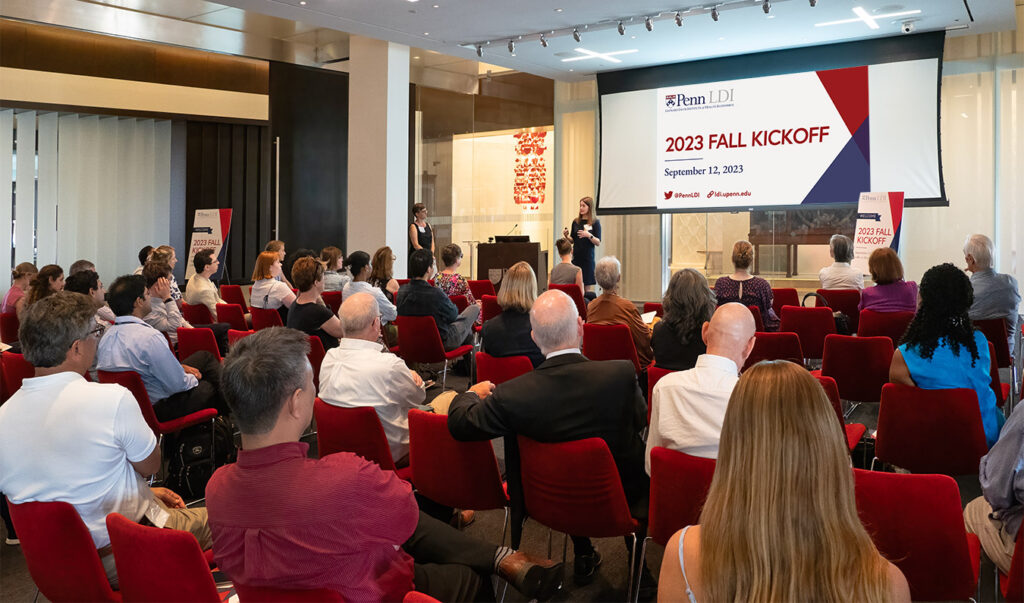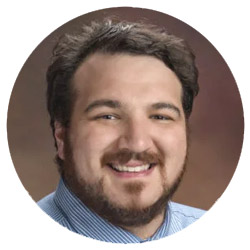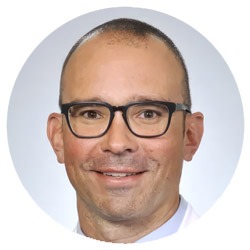
Meet the New LDI Senior Fellows – The 2022 Fall Kickoff
Seventeen Health Services Researchers from Across Penn Schools Seek Collaborators
News

A major service of the Leonard Davis Institute of Health Economics during (LDI) its 56-year history has been the facilitation of multidisciplinary collaboration among its hundreds of Senior and Associate Fellows. The annual LDI Fall Kickoff is one of the ways it achieves that by introducing new fellows and providing them with a speed-dating-like venue to briefly describe themselves, their work and their collaboration interests. The 2023 Kickoff took place on September 12 in Penn’s Van Pelt-Dietrich Library. Taking the stage were 17 new fellows and health services researchers from Penn’s Perelman School of Medicine, School of Nursing, School of Arts and Sciences, and Children’s Hospital of Philadelphia:

Sandra (Sandi) Amaral, MD, MHS
Associate Professor, Pediatrics and Epidemiology, Children’s Hospital of Philadelphia
Pediatric Transplantation and End-Stage Kidney Disease
Fun Fact: A mother of two, Sandra Amaral loves cooking and started a cooking camp to teach children with kidney disease and hypertension in the Philadelphia area how to cook kidney-friendly recipes. The focus of her work is on pediatric transplantation and end stage kidney disease, and she offered to help other LDI researchers interested in learning how to use the U.S. Renal Data System. She was recently awarded a National Institutes of Health (NIH) K26 Midcareer Investigator Award in Biomedical and Behavioral Research grant to enhance her mentoring skills with a focus on health equity. Another goal of the grant is to support a future workforce of researchers conducting research aligned with the goals of the National Institute of Diabetes and Digestive and Kidney Diseases (NIDDK). She also hopes to learn more about applying health equity frameworks in a more rigorous way.

Catherine (Katie) Auriemma, MD, MSHP
Assistant Professor, Medicine, Perelman School of Medicine
Research to Better Understand Palliative Patient Goals and Values
Fun fact: A hockey player for 20 years, Auriemma now has two children, who, she notes, are now her only athletic activity. A core faculty member at the Palliative and Advanced Illness Research (PAIR) Center at the Perelman School of Medicine, she’s on year two of a National Heart, Lung, and Blood Institute (NHLBI) K23 award for Mentored Patient-Oriented Research Career Development. “I frequently interact with patients and families where a clinical decision needs to be made and I can’t talk to the patient to find out about their goals and values. So, a lot of my research looks backwards to understand what kind of conversations, communication and documentation have occurred. I’m also interested in looking forward to understand how what we choose to measure in research defines our evidence base.”

Jere Behrman, PhD
Professor, Economics and Sociology, School of Arts and Sciences
Impact of Human Resources in Low and Middle Income Countries
The first of Behrman’s two fun facts is that in his birth cohort he believes he ranked at least in the top 1% of global basketball players with his 3-point shot and good defense moves. The second is that he is one of Penn’s longest serving faculty members, having joined the University in 1965. “I have extensive experience in social science and interdisciplinary explorations of the determinants and impacts of human resources, particularly in low- and middle-income countries,” he said. He also noted that he has a strong track record in publishing, perhaps helped by longevity in National Institutes of Health (NIH) and the National Science Foundation (NSF). He said he is always interested in new collaborative possibilities related to human capital, nutrition, education, training, and health over the lifecycle.

Barbara Chaiyachati, MD, PhD
Assistant Professor, Pediatrics, Children’s Hospital of Philadelphia
Child Abuse Pediatrics
A native of Iowa, a state famed for its field of dreams and bridges of Madison County, Chaiyachati’s fun fact is that she recently returned there to attend the Iowa State Fair to show her husband what a full-size cow made of butter looks like. At Children’s Hospital of Philadelphia (CHOP) she is a physician-scientist interested in addressing and abating the short and long-term effects of traumatic adversities, particularly child maltreatment. One area of her work focuses on genetic susceptibility and how experiences become biologically embedded. “I run a clinic for infants who are born substance exposed, which is an intersection of experiences, biologic predispositions, social constructs, and lots of complicated forces that we all need to do better at understanding. I’m a child abuse pediatrician and I’d love to work with any LDI colleagues who would like to think more about these things.”

Seul Ki Choi, PhD, MPH
Assistant Professor, Family and Community Health, School of Nursing
Health Equity in Sexual Minority Populations
Choi’s fun fact was about her last name being pronounced differently in the U.S. than it is in Korea. A Core Faculty Fellow at the Penn Eidos LGBTQ+ Health Initiative, her work implements health approaches to address social determinants of health and promote health equity among sexual minority populations. She uses digital platforms to reach sexual and gender minority youths, offer information related to HIV prevention, promote social support, and ultimately, reduce health inequities. “I try to evaluate true intervention effect by measuring pure data, which is engagement metrics,” she said. “I actually collaborate with social enterprises to create innovative solutions for the LGBTQ+ community, cultivating experienced leaders from community, academic, civic and business spheres to create solutions.”

Torrey Creed, PhD
Associate Professor, Psychiatry, Perelman School of Medicine
Equitable Access to Cognitive Behavioral Therapy (CBT)
A licensed clinical psychologist, Creed is the founder of the Penn Collaborative for CBT and Implementation Science, a center that emphasizes public-academic partnerships to increase equitable access to CBT and other evidence-based practices (EBPs); she is always seeking collaborators. She has been involved in community mental health partnerships for 17 years with the City of Philadelphia Department of Behavioral Health and Intellectual disAbility Services (DBHIDS) and directs the Penn Beck Community Initiative, a program to foster CBT in community mental health. She also has strong industry ties at the intersection of mental health and tech/artificial intelligence (AI). Current collaboration opportunities include broadening access to high quality mental health care beyond traditional therapy settings, and testing AI-driven supervision and fidelity measurement in community mental health.

Mario DeMarco, MD, MPH
Associate Professor, Clinical Family Medicine and Community Health, Perelman School of Medicine
Interconception Care for Mother and Children
“I’m a public health enthusiast, maternal health advocate, and a health policy wannabe and I’m looking to meet other people who are interested in those same things,” said DeMarco who is heavily involved in interconception care, or care provided to mothers between pregnancies to improve outcomes for mothers, newborns, and children. “We work to build medical homes offering one-stop shopping. For maternal child health, having this type of interaction where you can do [mother and child] care is really like the medical home for families.” He currently leads a Pennsylvania Department of Health grant to expand interconception care to more sites across Pennsylvania and leads a grant from the Health Resources and Services Administration (HRSA) to train primary care physicians in high-risk maternity care to improve maternal health outcomes.

Sarah Gutman, MD, MSPH
Assistant Professor, OB/GYN, Perelman School of Medicine
Prenatal and Abortion Patient Peer Support Groups
Gutman’s fun fact is that she met her husband while working in Haiti and dated for two months before she convinced him to move from Israel to the U.S. where they now have two children. “My research interest is in group care in the prenatal care and in the abortion care setting where women peer groups help support each other. I’m a family planning fellow, trained abortion advocate, and so most of my research has looked at evidence-based policies to help create policy in the U. S. and especially here in Pennsylvania, that can help keep abortion access available and legal for women,” she said. “I’m looking to LDI to find mentorship, particularly navigating projects that use evidence-based medicine to change policy and clinical practices, in obstetrics, and within complex family planning.”

Vinay Kampalath, MD, DTMH
Assistant Professor, Pediatrics, Perelman School of Medicine
International Humanitarian Emergencies
A rock climbing and vegan recipe enthusiast, Kampalath’s fun fact is that he has just come back from visiting his 83rd country. Much of this travel is related to his collaborative work with the World Health Organization, the University of Geneva, and other non-governmental organizations. His research on humanitarian emergencies, universal health coverage, emergency care development, and health systems has taken him to Laos, Bhutan, India, Bangladesh, Jordan, Greece, Botswana, South Africa, Sierra Leone, and Poland. He comes to LDI looking for cross-disciplinary collaborators on issues related to global health system strengthening, policy and financing. He is also working on projects related to migration and health in Europe, child morbidity and mortality in Syria, pediatric COVID-19 infection, and point-of-care ultrasound in the diagnosis of childhood pneumonia.

Garrett Keim, MD
Assistant Professor, Anesthesia and Critical Care Medicine, Perelman School of Medicine
Pediatric Respiratory Failure
Keim’s fun fact is that he has “achieved absolute mediocrity” in his hobbies of biking, baking, and beer brewing. The CHOP Pediatric Intensivist’s research focuses on pediatric respiratory failure and mechanical ventilation and works to improve how mechanical ventilation is set and adjusted. “When I first went into critical care, I didn’t focus that much on what happened before or after, outside of what was immediately important to the care,” he said. “But over time, I realized that just survival is not good enough and we really need to care more about what’s happening with these children over the long term. That’s how I became interested in post-discharge outcomes in intensive care unit (ICU) survivors and long-term outcomes for critically ill children based on differences in socioeconomic and racial factors that really are not well examined at all in pediatric critical care.”

Elizabeth Nesoff, PhD, MPH
Assistant Professor, Biostatistics, Epidemiology & Informatics, Perelman School of Medicine
Measuring Built Neighborhood Environments
Nesoff noted that it was hard to come up with a fun fact because when she is not working, she’s engaged with her children and dog. But she did point out that she has a really strong commitment to women’s education in the STEM fields and has provided 48 undergrads with research opportunities in STEM-related areas. A Senior Scholar in the Penn Injury Science Center, she is a social epidemiologist focused on the intersection of substance use, the neighborhood environment, injury prevention, and health disparities. “We’ve developed new tools for measuring the built environment in neighborhoods using things like systematic social observation,” she said. “If that is something that you’re interested in, I’m happy to talk about it. I also have some experience with mixed qualitative and quantitative methods, survey development, and psychometrics.”

Phillip Pierorazio, MD
Professor, Urology, Perelman School of Medicine
Cancer Care National Guidelines
Pierorazio runs the Delayed Intervention and Surveillance for Small Renal Masses (DISSRM) Registry—one of the largest active surveillance registries for patients with small kidney tumors. His research team that includes basic science researchers, statisticians, and other urologists both inside and outside Penn Medicine, focuses on access to care, cancer biomarkers, improving outcomes for complex surgeries, evaluating the quality of care through a cancer journey, the quality of life for cancer survivors, and minimizing the impact of surgical treatments. Additionally, he is involved in several national guideline panels, including both the American Urological Association (AUA) and National Comprehensive Cancer Network (NCCN) Guidelines Committees, for Kidney, Testicular, and Upper Tract Urothelial Cancer. He welcomes collaborators interested in improving the uptake and compliance with guidelines.

Vishnu Potluri, MD, MPH
Assistant Professor, Medicine, Perelman School of Medicine
Disparities in Kidney Transplant Access
Potluri, whose research focuses on improving outcomes for patients with end-stage kidney disease, became involved in the topic at home. Both his father and grandfather had the disease. “The dynamic around that in my own home with someone I love and talk to every day was like completely eye opening, so I focused a big part of my efforts into trying to bridge this gap within kidney disease,” he said. “When we start talking about transplantation, there’s a long process where there are over 500,000 people in the US who have kidney disease, but only 100,000 people get on the list. It’s hard to get on this list. So, my work has focused on disparities in access to research, access to transplantation, access to food and health outcomes, and payment policy. Some of the work was funded by LDI, and I’ve had the pleasure of working with so many other colleagues right here at Penn.”

Yuvaram Reddy, MBBS, MPH
Assistant Professor, Renal-Electrolyte & Hypertension Division, Perelman School of Medicine
Increasing Availability of Home Dialysis in the U.S.
A nephrologist at Penn and the Corporal Michael J. Crescenz VA Medical Center, Reddy’s research focuses on narrowing disparities in home dialysis use for patients with kidney failure. He is the Director of Diversity, Equity, and Inclusion for Penn’s Renal-Electrolyte and Hypertension Division, and a Core Investigator at the VA Center for Health Equity Research and Promotion (CHERP). “My areas of interest are in implementation science, trying to understand why we don’t do enough home dialysis in the U.S. and how we can improve that. I use mixed methods to try to better understand this issue. I also work on health policy with LDI pilot grants and am part of the Monogram Health Research Initiative,” he said. “I’m looking for collaborators interested in figuring out how to build more sustainable advisory boards for people with chronic illnesses.”

Andrea Schneider, MD, PhD
Assistant Professor, Neurology and Epidemiology, Perelman School of Medicine
The Epidemiology of Traumatic Brain Injury (TBI)
Schneider’s research is centered on neuroepidemiology. She has significant prior experience studying associations between clinical and subclinical vascular risk factors with cognitive and neuroimaging outcomes. Her current focus is investigating the epidemiology of traumatic brain injury (TBI). She has authored more than 70 peer-reviewed publications, and her research is currently funded by the Department of Defense and NIH grants. Dr. Schneider received her MD degree in 2014 from the Johns Hopkins University School of Medicine and her PhD degree in Epidemiology in 2012 from the Johns Hopkins University Bloomberg School of Public Health. She completed an epidemiology post-doctoral fellowship at the Bloomberg School of Public Health in 2014 before completing her neurology residency and neurocritical care fellowship at Johns Hopkins Hospital in 2020.

Catherine (Kate) Sharoky, MD, MSCE
Assistant Professor, Surgery, Perelman School of Medicine
Analyzing Institutional Patient Registry Data
Sharoky’s fun fact is that she used to be a news reporter covering city and county government and she interned at United Press International covering medicine and science when she was in college. She’s now in the Penn Medicine Division of Traumatology, Surgical Critical Care, and Emergency Surgery in the Department of Surgery focusing clinically and academically on emergency and critical care. “I have an institutional patient registry data set in EPIC for emergency general surgery patients that we’ve been collecting over the last two or three years,” she said. “I am the new NSQIP or National Surgical Quality Improvement Program Surgeon champion at the Hospital of the University of Pennsylvania (HUP). And I want to learn more about qualitative methods. Any innovative thoughts on how to access and work with registry data would be greatly appreciated.”

Kimberly Waddell, PhD, MSCI
Associate Professor, Physical Medicine and Rehabilitation, Perelman School of Medicine
Improving Disease Self-Management
Waddell’s fun fact is that prior to having her daughter two years ago she regularly competed in triathlons and hopes to get back to racing soon. An occupational therapist by clinical background, her research focuses on improving disease self-management and patient outcomes after stroke or with adults living with neurologic disability. The work also is using electronic health record systems to design nudge interventions to improve the efficiency of evidence-based care in rehabilitation and disability. “I am really interested in how people access and use rehabilitation and how disparities might affect that, specifically in populations living with neurologic disease like those with stroke or Parkinson’s Disease,” she said. “I’d like to connect with collaborators with expertise in clinical bias for a grant I’m now working on about rehab decision making.”

Seventeen Health Services Researchers from Across Penn Schools Seek Collaborators

Annual Tradition of Welcoming New Fellows Reinvents Itself on Bluejeans

Report from the 2019 Annual LDI Fall Kickoff Event

Eighteen Faculty Researchers From Across Penn Schools

18 New Investigators Welcomed to Penn’s Collaborative Hub of Health Services Research

Meet the 19 New LDI Senior Fellows